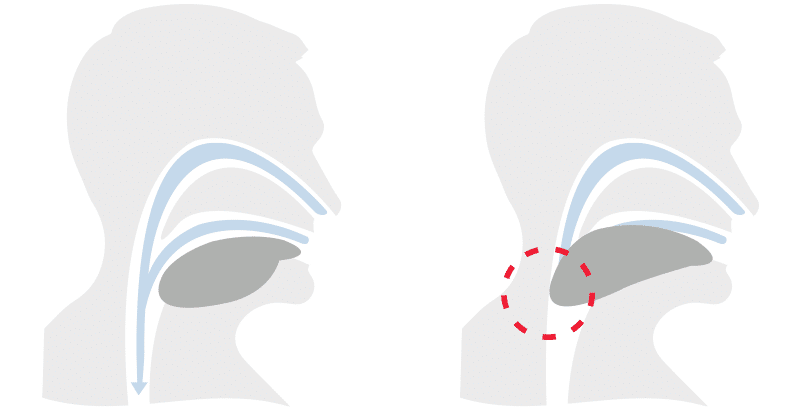We spend nearly one-third of our lives asleep. Without sleep, we wouldn’t be able to function properly. However, several things can negatively impact our sleep. Take snoring, for instance—it can disrupt your sleep and your partner’s sleep.
You might have heard this before but sleep deprivation can negatively affect our health—to the point where it can increase our risk of certain diseases!
Given that, it’s important that we get enough sleep every night. For adults, this means at least seven hours.
So if getting enough sleep and getting good sleep is vital to our health, what can we do about common disturbances such as snoring? What are some of the most common snoring causes, and what can we do to stop snoring? If you’re looking for answers, you’ve come to the right page.
We’ll be going over what you need to know below. Keep reading to learn more!
Complications of Snoring
Even occasional snoring can put you at risk for a number of complications.
For one thing, snoring tends to cause drowsiness, irritability, and fatigue. Naturally, that increases your risk of accidents, such as motor vehicle accidents. According to the AAA Foundation for Traffic Safety, 21% of fatal traffic accidents may be caused by drowsy driving.
Snoring also contributes to more serious health issues than many realize such as increasing the likelihood of certain diseases. Beyond annoying and keeping your bed partner awake at night, snoring can actually put you at a higher risk for abnormalities or thickening of the arteries which are responsible for vascular disease. That risk is even higher for snorers than smokers, those who are overweight or have high cholesterol according to a study. Lead study author Robert Deeb, M.D., with the Department of Otolaryngology – Head & Neck Surgery at Henry Ford commented, “Snoring is more than a bedtime annoyance and it shouldn’t be ignored. Patients need to seek treatment in the same way they would if they had sleep apnea, high blood pressure or other risk factors for cardiovascular disease.”
Snoring can also lead to high blood pressure and heart conditions such as stroke.
There’s also a chance that it can lead to learning difficulties—especially in children.
Related: How Sleep Disorders in Children Can Create Future Health Problems
Trying to Sleep at Night: 6 of the Most Common Snoring Causes
Several factors can cause you to snore. Each of these factors carry their own risk. Here are a few of the common ones and what you can do about them!
1. Obesity
Obesity can cause snoring. Generally speaking, this is due to the presence of neck fat. When you lie down, it compresses the upper airway, which makes snoring much more likely.
There’s the issue of abdominal fat as well. When you sleep, it can push your diaphragm up—as a result, the fat will compress the ribcage. As you can imagine, that would put pressure on your lungs, which would restrict airflow.
To make matters worse, people who snore tend to sleep poorly, making it more likely they will gain additional weight. They’ll experience food cravings, have a slower metabolism and their hormones, ghrelin and leptin, will be out of balance making them feel both hungrier and less full.
Weight loss can not only potentially decrease your risk of snoring, it can drastically increase your overall health as well.
2. Alcohol
Alcohol is a depressant. This means it will slow down the function of your central nervous system. As a result, it relaxes many of your muscles—including the ones that are involved with breathing.
Assuming that you drink before bed, its sedative effects can relax your jaw muscles—to the point where they can collapse onto your airway and can lead to snoring.
It’s also worth mentioning that alcohol can cause dehydration. In other words, it can dry out your throat, which would make your snoring even louder.
3. Nasal Problems
Certain nasal problems can contribute to snoring. Take polyps, for instance. These non-cancerous growths can block your nasal passages, which can cause the soft tissue in your throat and mouth to vibrate as you breathe.
Deviated septums, a misalignment of the cartilage in the nose, are another fairly common nasal problem. A person can be born with a deviated septum or it can be caused by trauma. Deviated septums are linked to congestion, snoring and sleep apnea.
Nighttime allergies can contribute to snoring as well. Your nasal passages can become inflamed when you’re exposed to allergens, such as dust, animal dander, and pollen. This triggers those familiar symptoms like a runny nose and congestion, which can cause snoring.
4. Aging
While it’s not uncommon for a young person to snore, your chances of snoring become greater with age. As we get older, our throat muscles will sag and can obstruct our airflow while we sleep.
Furthermore, post-menopausal women tend to snore more than pre and perimenopausal women because they have less estrogen. Estrogen helps keep womens’ muscles toned, including the muscles in the throat that keep the soft tissue firm and out of the path of the airway.
Older people also generally take more medications and often weigh more when they age. Both of these factors also increase the risk of snoring.
While we can’t turn back time, we can check with a doctor to make sure that we are making appropriate lifestyle changes to prevent or reduce the health risks caused by snoring. It may also be beneficial to ask your doctor about the medications you’re taking.
5. Pregnancy
More than one-third of pregnant women will snore, even if they weren’t a snorer before. As it turns out, there are a couple of reasons for this.
First, the amount of blood in your body increases when you’re pregnant—this causes your blood vessels to expand, which results in swollen nasal passages. Chances are, you’d have to breathe through your mouth, which contributes to snoring.
The weight gain that comes with pregnancy is the second culprit. This makes sense when you think about it—increased tissue in the throat and neck narrows your upper airway, which causes snoring.
Talk to your doctor about your snoring if it’s preventing you from getting restful sleep.
6. Sleep Apnea
Sleep Apnea is a serious condition in which a person stops breathing repeatedly during sleep. Left untreated, it can cut off the oxygen supply to the brain and the rest of the body.
Generally speaking, there are two types—obstructive sleep apnea (the throat muscles relax and collapse), and central sleep apnea (the brain fails to send proper signals to the muscles).
While lifestyle changes can help to alleviate symptoms, sleep apnea typically requires treatment. Without treatment, potential health risks for hypertension, stroke, diabetes, Alzheimer’s, and depression, among others increase. You can discover whether you may be at risk for sleep apnea, here.
If you’re uncertain whether your snoring is caused by sleep apnea, a sleep professional can help. 80% of snorers suffer from obstructive sleep apnea. An evaluation and a sleep test or sleep study can determine if that is what’s causing your snoring.
Getting a Good Night’s Sleep
These are six of the most common causes of snoring. As you can see, snoring can be caused by a number of underlying factors.
If you snore, given the potential consequences, seeking guidance and evaluation is recommended.
If you need some professional help feel free to contact us to set up an appointment!







